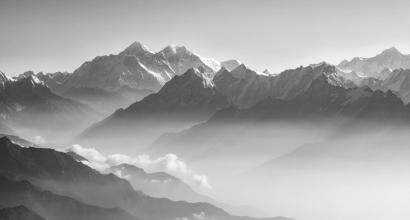Impurities comprise impressions carried over from many lives, or natural temperaments — different tastes, wavering wants and infatuations, etc. Thus, the unconscious tastes and impressions from past lives are the impurities. Some of them are to be suppressed and purged. Others are to be experienced fully and then only can they be done away with. Purifying the sattva means eradicating the past impressions. This happens when they are indulged and used up in dealings with the world.
Thus, in the system of human relationship with the world, there should be a strategy to destroy tamas, control the rajas and encourage sattva. This strategy should be according to the natural capabilities of the jīva. The system of varṇas is a scheme of relationship between the jīva and the universe that makes sure the capabilities of a jīva are used to further the welfare of the world, pares its tamas and rajas, and develops the inner nature of the ātmā. The basis of this system is prakṛti — unimpeded prakṛti. Bhagavān says that the system of four varṇas is based on the differences seen in the structure of the universe.
cāturvarṇyaṃ mayā sṛṣṭaṃ guṇa-karma-vibhāgaśaḥ ।
BG 4-13
Dharma is realist, not "fancyist". There are different kinds of guṇas and karmas in this creation. On one side, we have people with different kinds of abilities and energies. On another side, we have the world with different needs and objectives. Therefore, diversity and differences are present in the basic nature of the universe itself.
It is a fact of prakṛti that among beings, there are differences in capabilities and qualities. It is an exaggeration to say that everyone is equal. Indeed, don’t some idealistic seekers of excellence argue that everyone should be treated equally? If that comes into practice, we will suffer more than we do now. If all fingers of a hand become equal in length and thickness, can we hold a vessel or mix rice with them? When we say we want everyone to be equal, our only intention is that we should be treated on par with someone above us, and not that we want someone below us to be treated on par with us. This is the secret of the sloganeering about equality that is going on in the world now. Equality is only an external cover for self-prestige.
Dharma does not act according to such fancies. Short people are indeed short. Tall people are tall. Thin people are thin and fat people are fat. Dharma understands this reality. Treating a short man as a six-footer or a six-footer as a short person and acting accordingly is not dharma. One man might be brilliant, this other man might be dull. One person might have special abilities, another might be ordinary. Dharma is decided based on the differences between people. Satya or truth is factual. Dharma is that which does not follow anything but the actual fact. Giving a puḻḻangayi (Puḻḻangai unḍe is a sweet ball that is hard as a rock) ball to someone without teeth and tambiṭṭu (Tambiṭṭu is a traditional soft, sweet ball) to someone with strong teeth is not dharma. All dealings in the universe are a mishmash of things that are inherently different from one another. It will be necessary to adjust short with long, strong with weak. This is how different aspects are teamed together. A dull ox is yoked with a sharp one when oxen are yoked to a cart. One cart should not get only dull oxen; neither should another cart get only sharp ones. The idea is that we should take what help we can from the enchantments from the hands of prakṛti. A man who has a good voice can learn music easily. It may not be easy for him to learn Mathematics or wrestling. Therefore, it is fit for those who set up a system in the world to consider the needs of the world, and estimate who is naturally more capable of contributing what it needs to the world.
The various types and extents of qualities and capabilities seen in human nature mainly fall into four categories. They are the four jātis.
brāhmaṇa-kṣatriya-viśāṃ śūdrāṇāṃ ca parantapa ।
karmāṇi pravibhaktāni svabhāva-prabhavair-guṇaiḥ ॥BG 18.41
The duties of people are prescribed based on which qualities are naturally predominant in them. None of human capabilities is useless; no man is unfit — these are the fundamental principles with which all scholars of dharma-śāstras agree.
There is no one in the world who is completely useless. The challenge is to evaluate the potential and harness it. Vaiśyas are those who are more attentive towards money than others. A courageous and strong person can be a kṣatriya. Thus, dharma-śāstras evaluate the predispositions of people and decide their duties accordingly.
One should not think that this applies only to Hindu society. It is seen in all countries and all human societies. From the works of historians like Toynbee, we see that it was present in ancient Greece, Egypt and other countries. Just as there were some societal changes in India in the past two hundred years, there have been similar changes in England and other parts of Europe in the past three centuries. Distribution of wealth changed its course because of the industrial revolution. Since the distribution of wealth changed, the class and status of people also changed. In Shakespeare’s drama “Troilus and Cressida”, there is lamentation that class etiquette is eroding. It seems class differences existed in all societies. Westerners have not acknowledged it openly and have not named it as caste. The aspect exists, but it has not been evaluated philosophically. The varṇa differentiation described in the Gītā is natural in all human societies. Our ancients noticed this natural contrast and gave it a name. Western ancients did not notice it as we did, and do not call it by name. We see that many things and feelings around us do not have names. There is no difficulty in inferring that names such as Smith, Mason, Cook, etc., probably came from the professions of individuals. Now, they are all mixed up in their societies. Our society has still not become so heterogeneous.
We said that the varṇa differentiation outlined in the Gītā is naturally seen in all societies. We shall see the characteristics of Brāhmaṇas.
śamo-damas-tapaḥ śaucaṃ kṣāntir-ārjavam-eva ca ।
jñānaṃ vijñānam-āstikyaṃ brahma-karma-svabhāvajam ॥BG 18.42
“Śama, dama, tapas, śauca, dayā, ārjava, knowledge of Brahma, knowledge of the world and belief in the divine — one whose nature has these qualities is a Brāhmaṇa”.
We have talked about these qualities many times earlier. Jñāna means the knowledge of the ātmā, the knowledge of Brahma. Vijñāna is worldly knowledge — śāstras like engineering, medicine, etc. It is said “vijñānaṃ śilpa-śāstrayoḥ” - (Amarakośa 1.5.329) vijñāna is the knowledge of sculpture and science One should develop one’s knowledge that helps worldly life, and it should be propagated — this is a Brāhmaṇa’s natural propensity. He is a teacher. He should first gain knowledge and then distribute it among others.
svādhyāya-pravacane eveti nāko maudgalyaḥ । taddhi tapas-tadd-hi tapaḥ ॥
Tai. U. Śīkṣāvallī
Vyasa himself talks about the qualities of Brāhmaṇas elsewhere :
naitādṛśaṃ brāhmaṇasyāsti vittaṃ yathaikatā samatā satyatā ca ।
śīlaṃ sthitirdaṇḍanidānam-ārjavaṃ tatas-tatas-coparatiḥ kriyābhyaḥ ॥MBh, 12.169.35.1
Apparently, a Brāhmaṇa does not have any wealth greater than this one thing. What is that? Ekatā or consistency — to be steady and self-restrained; being one in mind, speech and behaviour, without any conflict. Samatā means that the mind is unchanged by dualities. Satyatā means established in truth. Shīla means good conduct. Sthiti means that if he believes in something, he constantly works towards it. Daṇḍanidāna means that he does not forget to correct himself in speech, mind and body. Ārjava is being straightforward. There is one last quality that has been listed : “tatas-tataś-coparatiḥ kriyābhyaḥ”. This is specific to Brāhmaṇas. He should perform karma. Now and then, he should step back and give it a rest. A Brāhmaṇa’s special quality is to not get attached to karma. It is detachment or withdrawal. Bhagavān says “saṅgaṃ tyaktvā” in the same sense. “This duty is not mine. I performed it because Bhagavān ordered it. I have performed the karma as required. Now I have to step back” — a brāhmaṇa’s mindset should thus allow him to rest from work.
Continuous work without rest is rajasic. It is the quality of kṣatriyas and vaiśyas. A brāhmaṇa is only established in karma when it is his duty; when there is no need for karma, he is established in the dhyāna of Bhagavān.
Very well. If we say that these qualities are that of a brāhmaṇa, does a man born in a brahmin family become a brahmin just because of his birth? We cannot escape this question; it has to be faced. Do we decide whether one is a brahmin from birth or from qualities? There is no doubt that quality is the ultimate characteristic that decides whether one is a brāhmaṇa. That birth influences quality, however, is a factor to be considered. Biologists now agree that familial qualities are passed on from generation to generation. It is an irrelevant question if we ask if the seed or field are different. Keeping this possibility aside, if we agree that there is an unbroken, straight lineage, we can conclude without a doubt that the above qualities of a brāhmaṇa have been transmitted from generation to generation from ancient times to the present times, even if ever so slightly.
To be continued...
The present series is a modern English translation of DVG’s Kendra Sahitya Akademi Award-winning work, Bhagavad-gītā-tātparya or Jīvana-dharma-yoga. The translators wish to express their thanks to Śatāvadhāni R Ganesh for his valuable feedback and to Hari Ravikumar for his astute edits.











































